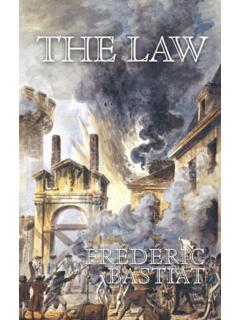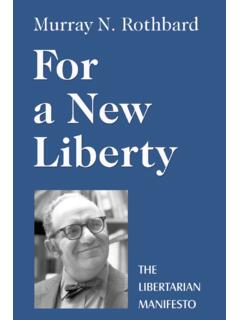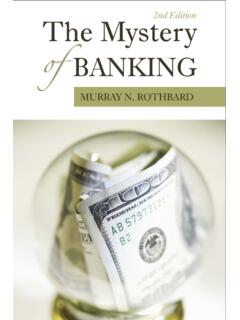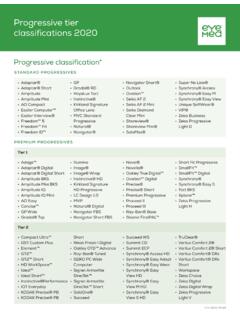Transcription of The Progressive Era - Mises Institute
1 The Progressive Era The Mises Institute dedicates this volume to all of its generous Supporters and wishes to thank these, in particular: Benefactors Susan B. McNiel, Mr. and Mrs. Donald M. Rembert, Sr., Steven R. Berger Mr. and Mrs. Gary J. Turpanjian, Juliana and Hunter Hastings Ryan Schmitt in Memory of William Norman Grigg Yousif Almoayyed and Budoor Kazim Patrons Anonymous, Behfar and Peiying Bastani in honor of those known and unknown who fight for liberty, Wayne Chapeskie, Carl S. Creager Thomas and Lisa Dierl, Reza Ektefaie, Willard and Donna Fischer Kevin R. Griffin, Jeff and Jamie Haenggi, Jule R. Herbert, Jr. Albert L.
2 Hillman, Jr., Hunter Lewis and Elizabeth Sidamon-Eristoff Arnold Lisio, MD in Memory of Margit von Mises , Arthur L. Loeb David McClain, Joseph Edward Paul Melville, Michael L. Merritt Gregory and Joy Morin, James Nardulli, Chris and Melodie Rufer, Leif Smith Dr. Thomas L. Wenck, Brian J. Wilton, Walter and Sharon Woodul III. Donors Anonymous, Wesley and Terri Alexander Thomas T. Amlie making amends for grandfather Thomas Ryum Amlie William H. Anderson, John Bartel, Dr. Thomas Beazlie, Ryan Best Bob and Rita Bost, R mi Boudreau, John Boyer, Michael L. Burks John L. Buttolph III, Prof. Paul Cantor, Terence Corcoran, Jim and Cherie Cox Paul Dietrich, Randall Dollahon and Kathleen Lacey, Jeffery M.
3 Doty Prof. Frank van Dun, Bill Eaton, David J. Emery, Eric Englund, John Rock Foster Dietmar Georg, Christopher Georgacas, Kevin Paul Hamilton Charles F. Hanes, Sheldon Hayer, Wilfrid Helms, Dr. Frederic Herman Adam W. Hogan, Greg E. Hood, Andrew C. Irvin, Eric N. Johnson Samuel J. Kain, Brett Keiser, Stephan and Cindy Kinsella, Mitchell Lawhorn Joseph Matarese, Brian E. Millsap, Ali Reza M., R. Nelson and Mary Nash Andrew Packer, Paul F. Peppard, Alan Reynolds, Peter A. Roof Patrick Rosenwald, Dr. Murray Sabrin, Thad and Cyndy Salmon Dr. John H. Scacchia, John L. Schroeder, Butler and Jane Shaffer, John P. Sharkey Henri Etel Skinner, Mr.
4 And Mrs. Dennis A. Sperduto, Steve Theodorou Richard Timberger, Pavel Tolkachev, Mitchell A. Vanya, Mark Walker J. Stanley Warford, Alice and Wayne Whitmore Rich and Janny Wilcke in loving memory of their sons Billy and Benny Edgar H. Williams, William B. Zieburtz, Jr. The Progressive Era MURRAY N. ROTHBARD. EDITED BY. PATRICK NEWMAN. FOREWORD BY. JUDGE ANDREW P. NAPOLITANO. MISESINSTITUTE. AUBURN, ALABAMA. Published 2017 by the Mises Institute . This work is licensed under a Creative Commons Attribution-NonCommercial-NoDerivs International License. Mises Institute 518 West Magnolia Ave. Auburn, Ala. 36832. paperback edition: 978-1-61016-674-4.
5 Large print edition: 978-1-61016-675-1. epub: 978-1-61016-677-5. Contents Foreword by Judge Andrew P. Napolitano .. 9. Introduction by Patrick Newman .. 15. Preface .. 37. Chapter 1: Railroads: The First Big Business and the Failure of the Cartels .. 41. 1. Subsidizing the Railroads .. 41. 2. The Rationale of Railroad Pricing .. 49. 3. The Attempts to Form Cartels .. 56. Chapter 2: Regulating the Railroads .. 67. 1. The Drive for Regulation.. 67. 2. Strengthening the Interstate Commerce Commission .. 80. Chapter 3: Attempts at Monopoly in American Industry .. 91. 1. America's Industrial Revolution.. 91. 2. The Petroleum Industry.
6 93. 3. Iron and Steel .. 98. 4. Agricultural Machinery.. 100. 5. The Sugar Trust .. 101. 6. Overall Assessment .. 104. Chapter 4: The Third Party System: Pietists vs. Liturgicals.. 109. 1. The Third Party System .. 109. 2. Pietists vs. Liturgicals: The Political Party Constituencies .. 115. 3. Pietists vs. Liturgicals in the Midwest .. 121. 4. Reform and the Drive for Prohibition.. 131. 5. 6 The Progressive Era Chapter 5: The Democratic Triumph of 1892 .. 135. 1. The Road to Democratic Triumph.. 135. 2. The Republicans Regroup .. 149. A. The Retreat from Prohibition.. 149. B. Restricting Immigration .. 151. C. Pietism and Women's Suffrage.
7 156. Chapter 6: 1896: The Collapse of the Third Party System and of Laissez-faire Politics .. 163. 1. The First Collapse: 1894 .. 163. 2. The Final Collapse: 1896 .. 168. 3. The Transformation of the Parties .. 178. Chapter 7: Theodore Roosevelt: The First Progressive , Part I .. 199. 1. Financial Influence on Political Parties.. 199. 2. : The Making of a Progressive .. 203. 3. as President: The Good Trusts .. 213. 4. as President: The Bad Trusts .. 224. 5. The International Oil War.. 230. Chapter 8: Theodore Roosevelt: The First Progressive , Part II .. 235. 1. The Meat Packing Myth .. 235. 2. Harvey W. Wiley and the Pure Food and Drug Act.
8 241. 3. Theodore Roosevelt and the Conservation Crusade.. 252. Chapter 9: The National Civic Federation: Big Business Organized for Progressivism .. 273. 1. The Origins: The Chicago Civic Federation .. 274. 2. Organizing the NCF .. 276. 3. The Clash over Unions .. 277. 4. The Drive for Workmen's Compensation Laws .. 279. 5. Monopolizing Public Utilities .. 284. 6. Regulating Industry .. 288. Contents 7. 7. Allied Group: The American Association for Labor Legislation.. 291. Chapter 10: The Progressive Era and the Family .. 295. 1. Ethnoreligious Conflict and the Public Schools .. 295. 2. Progressives, Public Education, and the Family: The Case of San Francisco.
9 302. 3. Ethnoreligious Conflict and the Rise of Feminism .. 309. A. Women's Suffrage .. 309. B. Eugenics and Birth Control .. 314. 4. Gathered Together: Progressivism as a Political Party .. 316. 5. Significance .. 318. Chapter 11: Origins of the Welfare State in America .. 321. 1. Why the Welfare State? .. 322. 2. Yankee Postmillennial Pietism.. 327. 3. Yankee Women: The Driving Force.. 332. 4. Progressives and the Gradual Secularization of Postmillennial Pietism: Ely, Dewey, and Commons .. 333. 5. Yankee Women Progressives .. 340. 6. The New Deal .. 350. 7. The Rockefellers and Social Security.. 356. Chapter 12: War Collectivism in World War I.
10 361. 1. Big Business and War Collectivism .. 363. 2. Intellectuals and the Legacy of War Collectivism .. 383. 3. The Drive to Prolong War Collectivism .. 389. Chapter 13: World War I as Fulfillment: Power and the Intellectuals .. 397. 1. Introduction .. 397. 2. Pietism and Prohibition .. 400. 3. Women at War and at the Polls .. 408. 4. Saving Our Boys from Alcohol and Vice .. 414. 8 The Progressive Era 5. The New Republic Collectivists .. 420. 6. Economics in Service of the State: The Empiricism of Richard T. Ely .. 428. 7. Economics in Service of the State: Government and Statistics.. 436. Appendix: Toward the Centralization of Science: The National Research Council.














